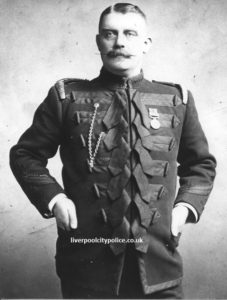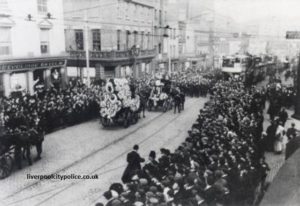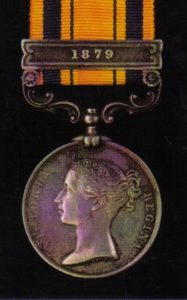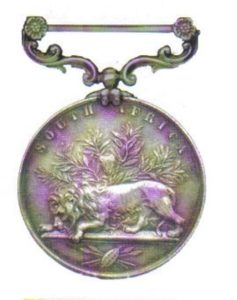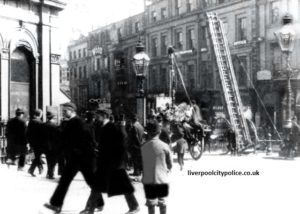CH SUPT. J. THOMAS by peter dellius, retired
The Zulu War
We have all no doubt seen the film Zulu and the heroic stand of the 24th of Foot (Contrary to the film, an English Regiment later designated the South Wales Borderers) The Battle depicted (Rorke’s Drift) took place during the Zulu War of 1877-8-9 and is well documented.
Residing in England at this time was the young Prince Imperial of France, Eugene Louis Jean Joseph Bonaparte (Designated Napoleon the IV by Bonapartists) He was the only child of Napoleon III and Eugenie de Moritijo and was born on the 16th of February 1856.
On the death of his Father and the demise of the 2nd French Empire he together with his Mother was exiled to England where he began a military career. It was thought that he would marry Princess Beatrice, youngest daughter of Queen Victoria.
On the outbreak of the Zulu war the Prince was keen to take part, he was denied, pressure was brought to bear on the War Department by his Mother via Queen Victoria and he was allowed to go on the understanding he would not be involved in battle and would observe only.
The Prince was a thorn in the side of the Senior Officers in his quest for battle and glory but they did their best to protect him.
On a the fateful day of the 1st June 1879 the Prince was allowed out on a scouting party with an Officer, Capt Carey who was a Jersey man, and seven other soldiers. The Prince was carrying the sword of Napoleon Bonaparte the 1st and was eager for action, however he had been sent to cover an area believed to be clear of Zulu’s and was in no danger, this had been contrived by Senior officers who had no wish to feel the wrath of the Queen.
Whilst on the patrol the party was surprised by a number of Zulu’s and the Prince engaged them, he gave a gallant account for himself but was, together with three soldiers, killed and disemboweled. Criticism was levied at Capt Carey who with four others, it is alleged did not go to assist the Prince. The Death of the Prince Imperial sent shock waves throughout Europe as he was the last of the Bonaparte’s.
What does this have to do with the Liverpool City Police?
On the evening of that dreadful day a search party was sent out to recover the body of the Prince. The search was conducted by the 17th Duke of Cambridge’s Own Lancers (Later the 17th/21st Lancers famous for their badge of a skull and Cross bone’s and the legend “Death or Glory “ Among that party was a young Trooper J. J. Thomas who recovered the body of the Prince and conveyed it back to the British lines. Trooper Thomas was later promoted to Corporal and continued his career until he joined the Liverpool City Police in 1889, he rose steadily through the ranks and served also in the “H” Division (Fire Brigade)
He became Deputy Superintendent of the Mounted Department and was appointed Chief Superintendent of the Fire Brigade (“H” Division) in 1899, from Constable to Ch.Supt in ten years a meteoric rise indeed. He lived in 11 Bold Place , Liverpool.
Chief Superintendent Thomas died in Service on the 27th October 1907, his funeral was most impressive and he was held in such regard that it was attended by hundreds, including the Chief Constables and Chief Fire Officers from many Force’s both local and National. He was laid to rest in West Derby Cemetery. So ended the Liverpool City Police connection with the most famous casualty of that conflict and the House of Napoleon.
Peter Dellius, July 2012
JAMES JEFFREY THOMAS
1859 Aug 08 – Born Atherstone, Warwickshire, the son of William a Sergeant in the Warwickshire Constabulary B 1830 Newtown, Montgomeryshire and Sarah B 1830 Birmingham.
1880 – Joined the Liverpool Borough Police as a PC on the beat at Hatton Garden living in the Section House
1881 Dec qtr – Married Edith Elizabeth, B 1857 Newcastle, Co Durham
1882 – Became a fire auxiliary
1883 Apr 21 – He was nearly killed by a collapse during a huge fire in Bates’ cotton warehouse on Lancelot’s Hey, damage amounted to £100,000
1885 – Promoted Sgt
1886 Oct – He was one of the first members of the Police Mounted Section on its formation
- He was the organiser of the Police Cycle Corps
1891 – By now he had transferred to the Fire Police and was stationed at Esk St as Eng Sgt 5’H’ in charge of the steamer ‘Hamilton’
- He was a founder member of the Police Athletic Society
1895 – Promoted Inspector, overseeing among others the Gt George & North Hill St escapes
1896 – Promoted C.Inspector and appointed D Supt of the LPFB after 7 months
1899 Jan – Promoted Supt, transferred back to the Police as OIC of ‘C’ Division.
Feb – Appointed Supt of the LPFB on the resignation of Willis
Jan to Mar – His wife Edith D aged 41½ ref 8b 443, leaving him with 7 children, the youngest aged 9.
Jne 26 – Promoted 3rd class C.Supt after 4 months in office
Sep qtr – He remarried to Eveline Beatrice, B 1879 Southsea, Hants
1902 Mar 29 Sat – Attended the inaugural meeting of the Association of Professional Fire Brigade Officers of the British Empire (AFFOBE) at which he was elected Vice-President
Jly – He attended a Fire exhibition in Berlin and noted the electric appliances on display.
1906 Jne – He was elected President of the AFFOBE, during their conference in Liverpool. He was one of 15 Chief Officers who now belonged to the Association.
Aug – He attended the Fire Brigade Congress in Milan where he inspected a petrol motor and an electric turntable escape. He noted the Paris, Basle and Munich brigades all had electric appliances.
1907 Jne 11 – He recommended to WC an 85’ Electric Escape and an Electric 1st turn machine be ordered from H Simonis Ltd based on his inspections of similar machines during his European trips.
Oct 27 Sun 06.30 – He died at his quarters in 9 Hatton Garden after an illness lasting 3 weeks, aged 48 with 27 years service, of disease .
Oct 29 Tue – Given a formal brigade funeral the cortege going from his quarters at Hatton Garden, via Dale St, he was buried in West Derby cemetery.
Nov 14 – A Grand Matinee was held at the Empire Theatre to raise funds for a memorial & £575 was raised. The Committee was chaired by Mr Harris Finsberg. The Liverpool Monumental Co were contracted to produce a memorial including an axe and helmet to be placed over his grave. The balance of monies was to be used for the benefit of the late Superintendent’s 5 dependent children.
1908 Sep 23 – His memorial was unveiled in West Derby Cemetery. The obelisk bears the inscription “His life was useful; his end was peace”.
Medals:
South African medal with clasp 1879
Bronze Insignia of the Imperial Fire Service Society of Russia 1905.
Merseyside Fire Museum – July 2012


